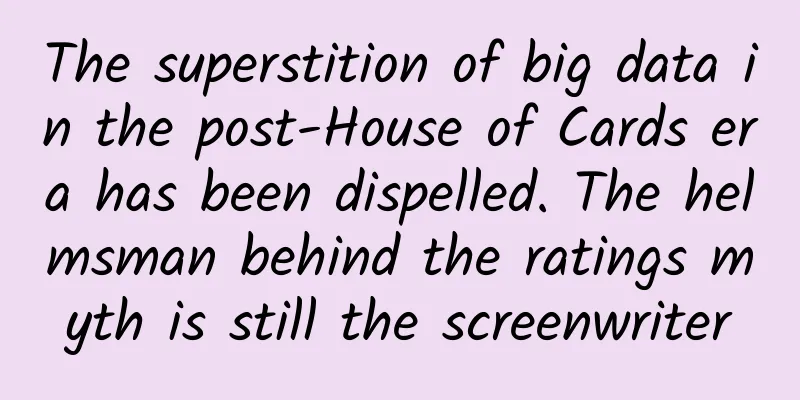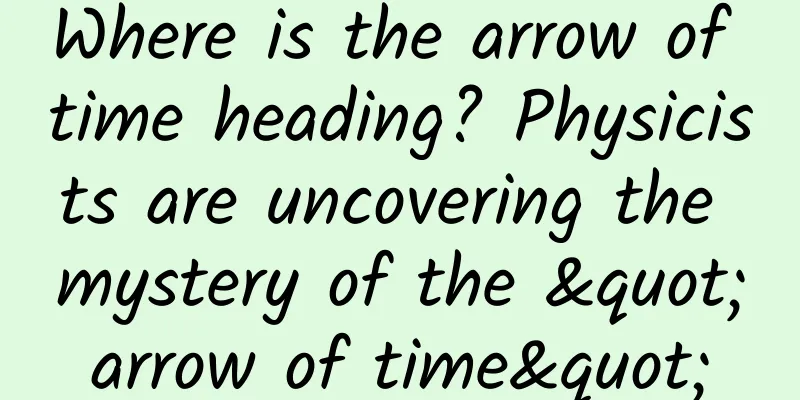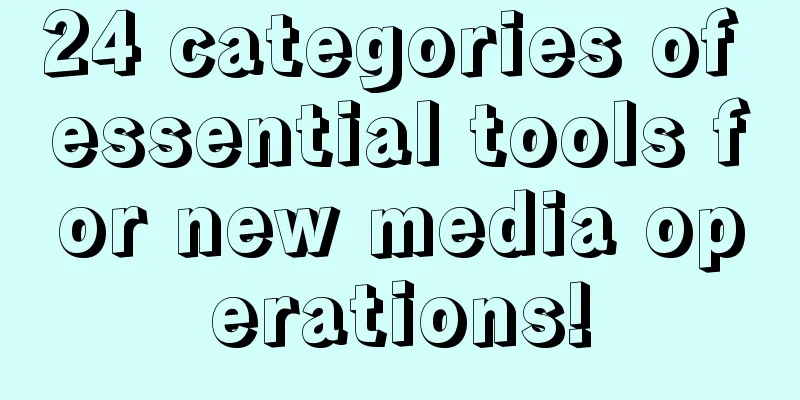The superstition of big data in the post-House of Cards era has been dispelled. The helmsman behind the ratings myth is still the screenwriter

|
When talking about big data in film and television, we can’t avoid House of Cards. "Netflix analyzed the video viewing behavior data of 30 million North American users and found that the audiences of the three keywords Kevin Spacey, David Fincher and the British TV series "House of Cards" overlapped, and thus predicted that a film combining these three elements would be a huge hit." This ambiguous description was so tempting that it seemed to start a revolution in film and television! It became a hot topic in the film and television industry last year, and it also inspired my company to try to get involved in this field. But back to the origin, is the reason for the success of the American TV series "House of Cards" really as simple as "1+1+1"? If the data is really so amazing, why didn't Netflix's first self-produced series "Lilyheimer" and the self-produced series "Hemlock Grove" after "House of Cards" replicate the glory? 【one】 In fact, this is how House of Cards was born - The idea of remaking the British TV series "House of Cards" came from the producer MRC. At that time, the film company was preparing to transform into shooting TV series and planned to make a big move with the film resources it had accumulated. It happened that an intern in the company watched this British "old drama" on the plane and contacted the British copyright holder directly. After obtaining permission, she recommended it to her boss Modi Wikcik. This happened in 2008 or 2009. After the production company MRC signed the adaptation rights for the British version of "House of Cards", it went to CAA, the largest agency in Hollywood, to form a core team of the crew, including director David Fincher, screenwriter Eric Roth, and actor Kevin Spacey. Because the team and the script were packaged together, the agency could get a commission of 10% of the total budget (yes, David Fincher and Kevin Spacey, who are popular with users, "happened" to be in the same agency). MRC invested the first start-up capital to let the creators start writing the pilot script. At this time, "House of Cards" had nothing to do with Netflix. In 2011, when Fincher was recommending House of Cards to various production companies, Netflix's content director Ted Sarandos decided to recommend himself to them. "You have a thousand reasons not to work with Netflix," he told Fincher, but there was one biggest reason to work with Netflix: he promised to book two full seasons of 13 episodes each for $100 million, guaranteed payment in advance, no need to worry about ratings, no need to fight for time slots, and basically no interference in art. The cost of each episode was about $4 million, far higher than the production cost of a single episode of a general American TV series - $1.5 million to $2 million. And what he got in return was an important series with a cast of movie stars and an executive producer nominated for an Oscar. This is the story. The decisive factor in the birth of "House of Cards" was not "big data", but the eternal keywords in the film and television industry - "funds" and "connections". 【two】 So can the creation of "House of Cards" be calculated by "big data"? Let’s take a look at the New York Times article “A Deep Explanation of the Production Process and Power Philosophy of House of Cards.” The article is very long, I summarize and excerpt some of the points as follows: David Fincher only directed the first two episodes of "House of Cards" and then went on to work on other projects. The real soul of "House of Cards" is producer Beau Willimon (who was nominated for an Oscar for Best Adapted Screenplay for "The Assassination of Ivanka Trump"). He has deeply imprinted his political and dramatic views on "House of Cards", and his political experience comes from his practical experience in political activities many years ago and in-depth exchanges with the political consultants of this show. In the past four years, it seems that Willimon has been thinking about "House of Cards" when he eats, sleeps, and dreams. He has 46,000 - or maybe 460,000 details to worry about. He pursues perfection to the point of obsessive-compulsive disorder. Once, on the way to the studio, Willimon excitedly said that Underwood's office was almost exactly the same as the office of the House Majority Supervisor in real life, even noting details such as the height of the light switch. During the filming of the second season, he either stayed in the writing room of the hotel room or in the simple trailer near the set, following the crew everywhere, and spent most of the day writing or rewriting the script for the new episode, only taking a nap occasionally... Netflix showed him the company's internal synopsis of each episode, and Willimon read it and rewrote it himself... The writers' room for House of Cards is a bit like a graduate student seminar on character development, led by a particularly enthusiastic young professor. Most of these wide-ranging conversations are not about solving a specific, sticky plot point, but about larger character questions. Why would someone do this? This is the question Willimon asks again and again. For all its betrayals and dark machinations, House of Cards is ultimately about character... Willimon's almost monastic devotion helped propel "House of Cards" to prominence, winning three Emmys and a Golden Globe last year, thanks in large part to its high degree of verisimilitude and its lurid drama - murder, manipulation and betrayal that would have been worthy of Shakespeare. It can be seen that compared with the "big data" gimmick, the great success of "House of Cards" relies more on "movie-like texture", "solid plot", "moving characters" and "vivid performances"... This is not new at all, but closer to reality. 【three】 By the way, did "big data" really help "House of Cards"? The answer is, yes! Let’s first look at what data Netflix has—— When a user logs into a Netflix account through a browser, Netflix's background technology quietly records the user's location data and device data. These memory codes also include the user's collections and recommendations to social networks during the viewing process. In Netflix's view, pause, rewind, fast forward, stop and other actions are all behaviors. Every day, users will generate more than 30 million behaviors on Netflix. In addition, Netflix's subscribers will give 4 million ratings and 3 million search requests every day, asking about the play time and device of the series. That's right, these are all converted into codes by Netflix and recorded as elements of content production. Its chief content officer Ted said that all this data means that Netflix already has "addressable audiences." In the early years, Netflix used the above data to provide a recommendation engine business. For example, tens of millions of users can rate movies from 1 to 5 on a personalized webpage. These ratings constitute a huge data pool, which now has a capacity of more than 10 billion. Based on the data pool, Netflix uses recommendation algorithms to identify viewers with similar tastes, and then makes accurate recommendations of relevant content to this group. “Netflix may not know exactly why an individual hits the pause button, but if enough people do the same thing at the same point throughout a video, the data starts to make sense.” The result is that Netflix knows your viewing preferences better than you do. This is how they turn “data into productivity”—— According to official data, three-quarters of subscribers will accept Netflix's movie recommendations. This means that Netflix does not need to accumulate word-of-mouth for the new series "House of Cards" episode by episode, but only needs to recommend it to viewers who are labeled as "like Kevin Spacey" or "like political dramas." Netflix has observed another popular trend through "big data": more and more people are no longer sitting in front of the TV at a fixed time on a fixed night, waiting to watch the latest episodes of a TV series as they did 30 years ago. Instead, they "save up" until the entire season is finished, and then choose a convenient time and place to watch it all at once on a convenient device, mostly Internet devices such as computers and iPads. "The weekly release model of new series is quickly becoming outdated. It is a product of the live TV shows in the 1960s and 1970s. Today people want to be unfettered and watch what they want and as much as they want," said Beau Willimon, producer of "House of Cards." It can be seen that the data can indeed tell Netflix that there is an overlap in the audiences of Kevin Spacey, David Fincher and the British TV series "House of Cards". This is the basis for Netflix's decision to take a gamble and spend 100 million US dollars to shoot this drama. It is also one of the reasons why "in order to invite Kevin Spacey to star in the show, the crew waited for another 10 months." More and more American paying users like to "collect series and watch them all at once", which also became the basis for Netflix's groundbreaking decision to "release 13 episodes at once". 【Four】 What about the script? How does data help? The report mentioned that - "One thing the creators all acknowledged is that they viewed the TV series as a 13-hour movie. Only by viewing the 13 episodes as a whole from the beginning can they control the rhythm and intensity. For example, a seemingly casual shot shows the protagonist's wife Claire giving $20 to a homeless man. The next day, he threw the $20 back to Claire, and the banknote had been folded into a thousand paper cranes. In the next episode, Claire learned how to origami from YouTube. In the next episode, she drove Peter Russo's two children home and exchanged their trust with origami works. The audience can clearly see the metaphorical relationship that the screenwriter has established between the character of Claire and origami." Apart from this, there seems to be little mention in public reports about "how data guides creation" - and this is precisely the issue that all film and television companies and video websites are most concerned about. The following is my personal judgment based on experience. I look forward to exchanging opinions and discussing with you (especially the video website data team): First, Netflix needs to select "reference series". The more relevant they are, the more valuable they are. Political series are undoubtedly the best choice (assuming Netflix has playback data). The British series "House of Cards" is the first choice, followed by "The West Wing", "Veep", "Scandal", "Homeland" and other series. Then, analyze and count the multi-dimensional data of these episodes such as "pause, rewind, fast forward, stop, search, share, favorite, comment" etc. Find out some obvious features, such as (the data are all hypothetical) - 36% of viewers will fast forward from the 23rd to 32nd minute of Episode 4; pause or even rewind at the 47th minute of Episode 10; After the fifth episode, 89% of people chose to watch the sixth episode immediately, which is much higher than the average of 33%. However, after the ninth episode, only 13% of people watched the tenth episode immediately. In the comments of episode 9, the audience was angry about the male protagonist's cheating behavior, but after episode 12, this anger turned into pity; 78% of viewers persisted in watching the show to the end. Among those who gave up, more than half stopped at episode 7. Among all viewers who watched episode 11, 90% of them persisted in watching the show to the end. The next step is to look back at the corresponding drama content based on the data to see what the plot was at that minute in that episode. Finally, we come to the most important stage of analysis, which is to find out the tastes of the audience of political dramas. What kind of suspense do you like? Is the supporting character still alive? Will the bill pass? Will the confession be accepted? ——What topics do you like? The rules of the political game? The love between the hero and heroine? How much does it resonate with the real world? ——What kind of scenes do you like? Fighting? Negotiation? Sexual suggestion? … The above is my conjecture of the data analysis process under ideal circumstances. I hope that practitioners of video websites will jump out and criticize and correct me. But I personally think that even if the data can really tell us the above information, it is impossible to fundamentally shake the main theme of "House of Cards" - those cold themes, sharp lines, and profound insights into human nature cannot be written by data. Data is at most a compass, or even just a flashlight, and Beau Willimon is the captain of House of Cards. As a winner of Toutiao's Qingyun Plan and Baijiahao's Bai+ Plan, the 2019 Baidu Digital Author of the Year, the Baijiahao's Most Popular Author in the Technology Field, the 2019 Sogou Technology and Culture Author, and the 2021 Baijiahao Quarterly Influential Creator, he has won many awards, including the 2013 Sohu Best Industry Media Person, the 2015 China New Media Entrepreneurship Competition Beijing Third Place, the 2015 Guangmang Experience Award, the 2015 China New Media Entrepreneurship Competition Finals Third Place, and the 2018 Baidu Dynamic Annual Powerful Celebrity. |
Recommend
14 amazing skills, information flow conversion increased by 100%!
This article is a summary of the book "The B...
30 popular short video shooting techniques!
Shooting short videos is not as difficult as you ...
Apps with data - data expressions on mobile phones
Previously, I studied the best way to express dat...
Technology changes coffee: Onecup turns you into a top barista in seconds and beats Starbucks
As an imported drink, coffee has gradually been a...
Xiaomi may lead the privatization or even direct acquisition of Xunlei
On June 30, Forbes website published an article s...
Light snow today | How does “Snow Lady” make snow?
In traditional Chinese culture, there are many go...
Why does heated salt water turn into crystals, but heated sugar water turns into syrup?
This is a very interesting question, involving th...
Analysis of Himalaya's competitive products
Preface : From Himalaya , I have briefly analyzed...
Are we evolving towards "Iron Man" with smart organ implants?
Last week, we launched the special topic "Sm...
Why is seafood not tasty when it’s dead? For tips on choosing seafood, just read this article!
Friends who have bought seafood know that after f...
Did you sleep well today?
This is the 3602nd article of Da Yi Xiao Hu A bus...
How to create a hit short video? What new ways to play?
Nowadays, short videos have become a new trend th...
By mastering these points, you can also plan an event that will sweep your circle of friends!
All of you in the Internet industry should be awa...
One picture will help you understand the National People’s Congress and the Chinese People’s Political Consultative Conference!
The two sessions have begun! How much do you know...
How to write high-quality creatives in Baidu bidding promotion?
How to write high-quality creative ideas in Baidu...









